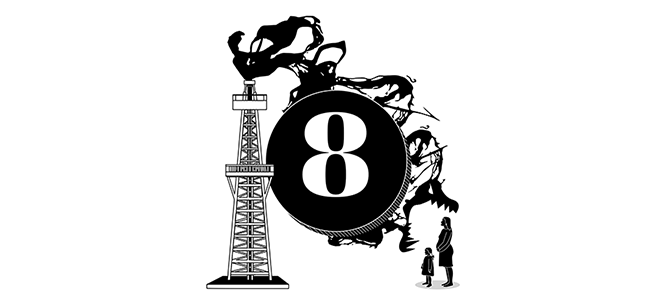Media censorship patterns signal a deeper truth: Our economics and our species' survival are deeply at odds.
Project Censored 2023
By Paul RosenbergEach year, Project Censored releases a list of the Top 10 un- and under-reported news stories. Part I of the 2023 list—which included the ubiquity and regulation of dangerous chemicals, the blurring lines between Big Tech and Big Brother, the potential for stalkerware to be used against abortion patients and the erroneous claims of so-called "carbon offset" programs—was published in the Dec. 21 issue and is available at cityweekly.net.
Part II continues below.
6. Unions Won More Than 70% of Their Elections in 2022, and Their Victories Are Being Driven by Workers of Color
Unions won more than 70% of their certification elections in 2022, according to reporting by NPR and The Conversation, and workers of color were responsible for 100% of union growth, according to an analysis by the Economic Policy Institute reported by Payday Report and the New Republic.
More than 2,000 petitions for union representation were filed with the National Labor Relations Board (NLRB) in fiscal year 2022 (from Oct. 1, 2021, to Sept. 30, 2022), up 53% from FY 2021. Roughly 1,200 certification elections were held, with 72% voting to certify a union as their collective bargaining agent.
"The entire increase in unionization in 2022 was among workers of color—workers of color saw an increase of 231,000, while white workers saw a decrease of 31,000," EPI wrote in a Feb. 2023 press release.
EPI also noted that "Survey data show that nearly half of nonunion workers (48%) would vote to unionize their workplace if they could. That means that more than 60 million workers wanted to join a union, but couldn't.
The Protecting the Right to Organize (PRO) Act and the Public Service Freedom to Negotiate Act provide crucial reforms that would strengthen workers' rights to form a union and engage in collective bargaining." It passed the House in 2020 and 2021 but died in the Senate, where it needed 60 votes to pass because of the filibuster.
"Seventy-one percent of Americans now support unions according to Gallup—a level of support not seen since 1965," Project Censored noted. "Dismantling existing barriers to union organizing and collective bargaining is crucial to generating a more prosperous, equitable economy," EPI concluded.
More than a quarter of 2022 union elections—354—were held at Starbucks, Marick Masters explained in his January 2023 article for The Conversation. "Workers at Starbucks prevailed in four out of every five elections. Workers at Chipotle, Trader Joe's, and Apple unionized for the first time, while workers at Microsoft and Wells Fargo also had wins," Project Censored reported.
Union activity spikes during times of social unrest, Masters reported. Unionization rose from 7.6% to 19.2% from 1934 to 1939, during the Great Depression, and from 20% to 27% between 1941 and 1945, during World War II. "Masters described the current wave of union activity as driven by record levels of economic inequality and continued mobilization of workers in 'essential industries,' such as healthcare, food and public safety, who were thrust into harm's way during the global pandemic," Project Censored noted.
"Whereas Republican and Democratic politicians often separate concerns over working conditions and pay from issues of identity, these data demonstrate how identity and workers' rights are closely connected," Project Censored added. "Unionization and labor struggles are direct mechanisms to better accomplish racial and social equality; the ability for people to afford to live happy and dignified lives is inherently tied to their ability to enjoy fundamental social and civil rights within those lives, too," Prem Thakker noted at the New Republic.
Despite these gains, "the power of organized labor is nowhere close to what it once was," Project Censored wrote. "As Masters pointed out, more than a third of workers were unionized in the 1950s, whereas only a tenth were in 2021. Before the 1980s, there were typically more than 5,000 union elections in any given year, and as recently as 1980, there were 200 major work stoppages [over 1,000 workers]," compared to just 20 in 2022, which was still 25% above the average over the past 16 years.
"Corporate media coverage of the labor resurgence of 2022 was highly selective and, in some ways, misleading," Project Censored reported. There've been hundreds of articles on union organizing at Starbucks and Amazon and among graduate students, and "Yahoo republished Masters's The Conversation article about union success in elections, and Vox, Bloomberg Law and The Washington Post all remarked on organized labor's recent string of certification vote victories," they noted. "Yet corporate coverage of current labor organizing often fails to address the outsized role played by workers of color in union growth."
Nor has it placed recent union successes in the historical context of prolonged decline, largely due to private employers' heavy-handed efforts to undermine organizing campaigns and labor laws that strongly favor employers.
7. Fossil Fuel Investors Sue Governments to Block Climate Regulations
"Litigation terrorism." That's what Nobel Prize-winning economist Joseph Stiglitz called the practice of fossil fuel companies and investors suing governments in secretive private tribunals to thwart climate change policies. Litigants claim climate change laws undermine their profits and, thus, they must be compensated under what's known as "investor-state dispute settlement" [ISDS] legal actions, Rishika Pardikar reported for The Lever in June 2022, following a paper in Science by lead author Kyla Tienhaara the month before. It found that "Global action on climate change could generate upward of $340 billion in legal claims from oil and gas investors," which, "is more than the total level of public climate finance globally in 2020 ($321 billion)."
A good portion threatens the global south. "The five countries with the greatest potential losses from ISDS are Mozambique ($7 billion-31 billion), Guyana ($5 billion-21 billion), Venezuela ($3 billion-21 billion), Russia ($2 billion-16 billion) and the United Kingdom ($3 billion-14 billion)," Tienhaara reported, saying, "If countries decide to also cancel oil and gas projects that are currently under development, this could introduce substantial additional financial losses from ISDS claims."
"Such [litigation] moves could have a chilling effect on countries' ability to take climate action because of the fear and uncertainty they cause," Pardikar noted. "New Zealand, for example, recently said that it could not join the Beyond Oil and Gas Alliance, an international consortium of governments working to phase out fossil fuels, because doing so 'would have run afoul of investor-state settlements,'" Lois Parshley reported for Grist in January 2023.
Project Censored also cited Lea Di Salvatore's December 2021 report that fossil fuel "investors succeeded in 72% of all cases," winning an average over $600 million, "almost five times the amount awarded in non-fossil fuel cases." In addition, secrecy is the rule. She noted, "Fifty-four percent of the concluded fossil fuel cases are confidential—while their existence is known, no case-related documents, such as awards or decisions, have been made public."
Although the tribunals may sound like courts, they aren't. "Because ISDS systems are written into thousands of different treaties, each with different wording, there's also no system of precedence," Parshley wrote, after noting the practice of 'double batting,' in which one individual may act as arbitrator, legal counsel, expert witness and tribunal secretary, either sequentially or even concurrently. Most come from "an elite group of approximately 50 arbitrators who are regularly appointed" to most cases, researcher Silvia Steininger told Pardikar. Conflicts of interest "are viewed as commonplace in international investment arbitration and considered an inherent part of the system," the Law Review article Parshley references said. What's more, "Just because arbitrators decide something in one case doesn't mean that logic has to be applied to another. Proceedings can be kept confidential, and there is no way to appeal a tribunal's decision," Parshley noted.
Tienhaara's paper ended with a section "An Abolitionist Approach," where she warned, "Reformist approaches would be time-consuming and likely ineffectual, based on the experience of previous efforts." Abolitionist examples include "Terminating all bilateral investment treaties" in order to "prevent existing leaseholders from accessing ISDS," as South Africa and others have done "without any resulting reductions in foreign investment."
Negotiating the "removal of ISDS clauses from trade agreements, as the United States did with Canada in the US-Mexico-Canada Agreement," is also possible. "Another option is for states to withdraw consent to ISDS in cases involving fossil fuel investments, emulating the approach taken by Singapore and others to remove the threat of ISDS claims from the tobacco industry." But abolitionists face two problems: "sunset clauses" that extend treaty protections "for 10 to 20 years for investments commenced prior to termination," though they can be nullified, and resistance "from states with powerful fossil fuel lobbies."
Parshley noted that the Energy Charter Treaty, "ratified by over 50 primarily European countries," is the largest international agreement protecting fossil fuel companies. After six countries announced their withdrawal and a modification effort failed, "the European Parliament called for a coordinated European Union departure from the treaty altogether," but they still face sunset clause threats.
While the Independent also reported on ISDS lawsuits "it only briefly touched on the concern that these lawsuits could prevent climate action," Project Censored noted. "Beyond this handful of reports, the topic has received little coverage from major news outlets."
8. Proximity to Oil and Gas Extraction Sites Linked to Maternal Health Risks and Childhood Leukemia
"Two epidemiological studies, from 2021 and 2022, provide new evidence that living near oil and gas extraction sites is hazardous to human health," Project Censored reports, "especially for pregnant mothers and children, as reported by Nick Cunningham for DeSmog and Tom Perkins for The Guardian."
Based on 1996-2009 data for more than 2.8 million pregnant women in Texas, researchers from Oregon State University (OSU) found that "for those pregnant women within one kilometer of drilling there's about a 5 percent increase in odds of gestational hypertension, and 26 percent increase odds of eclampsia," researcher Mary Willis told DeSmog. "So, it's this really close range where we are seeing a potential impact right on women's health." Eclampsia is a rare but serious condition where high blood pressure results in seizures during pregnancy.
"Notably, the data in the OSU study predate the widespread development of 'fracking,' or hydraulic fracturing, the process of extracting gas and oil from shale beds by injecting fluids at high pressure," Project Censored pointed out.
The second study, from Yale, did study fracking. It found that "Young children living near fracking wells at birth [less than two kilometers (approximately 1.2 miles)] are up to three times more likely to later develop leukemia," according to an August 2022 Guardian story. "Hundreds of chemicals linked to cancer and other health issues may be used in the [fracking] process, including heavy metals, polycyclic aromatic hydrocarbons, volatile organic compounds, benzene and radioactive material," they explained.
The study, based on 2009-2017 data from Pennsylvania, compared 405 children aged 2 to 7 who were diagnosed with acute lymphoblastic leukemia with an additional 2,080 children, matched on birth year, who didn't have leukemia. The findings aligned with others, as DeSmog discussed.
"One consistent takeaway from so many health studies related to fracking is that proximity is key," they reported. "The allowable setback in Pennsylvania, where our study was conducted, is 500 feet," Yale researcher Cassandra Clark told them. "Our findings ... in conjunction with evidence from numerous other studies, suggest that existing setback distances are insufficiently protective of children's health."
State and local governments have tried to create health buffer zones, but, "The oil industry has consistently fought hard to block setback distance requirements," DeSmog reported. For example, "In 2018, the oil industry spent upward of $40 million to defeat a Colorado ballot measure that would have imposed 2,500-foot setback requirements for drillers." Regulations are so weak that "In Texas, drilling sites can be as close as 45 meters from residences," Willis told them.
"Last year, California Gov. Gavin Newsom announced new proposed rules that would require 3,200-foot setbacks on new oil and gas drilling, which would be the strongest in the nation and aligns with the distance where Willis's studies find the most serious risks for pregnancies," DeSmog reported. "But those rules would not affect existing wells."
No major U.S. newspapers appear to have covered either the OSU or the Yale study at the time of Project Censored's publication, although "Smithsonian magazine, The Hill and WHYY—an NPR affiliate serving the Philadelphia region—covered the fracking study."
9. Deadly Decade for Environmental Activists
At least 1,733 environmental activists were murdered between 2012 and 2021—nearly one every two days across 10 years—according to the Global Witness study, Decade of Defiance. The victims were "killed by hitmen, organized crime groups and their own governments," Patrick Greenfield reported for The Guardian. "Brazil, Colombia, the Philippines, Mexico and Honduras [were] the deadliest," with half the attacks taking place in the first three countries, each reporting around 300 killings.
"This has been going on for decades," scientist, activist, and author Vandana Shiva wrote in a foreword to the report.
"The report shows Brazil has been the deadliest country for environmental defenders with 342 lethal attacks reported since 2012 with over 85% of killings within the Brazilian Amazon," Stuti Mishra reported for the Independent. "Mexico and Honduras witnessed over 100 killings while Guatemala and India saw 80 and 79 respectively, remaining one of the most dangerous countries. The report also notes 12 mass killings, including three in India and four in Mexico."
"The killing of environmental activists has been concentrated in the Global South," and "Indigenous land defenders are disproportionately impacted," Project Censored warned. "The Guardian reported that 39% of those killed were from Indigenous communities, despite ... constituting only 5% of the global population."
"This is about land inequality, in that defenders are fighting for their land, and in this increasing race to get more land to acquire and exploit resources, the victims are indigenous communities, local communities, whose voices are being suppressed," the BBC concluded.
"Threats to environmental activists are not limited to killing," Project Censored noted. "Environmental activists also face beatings, arbitrary arrests and detention, strategic lawsuits against public participation (SLAPPs) brought by companies, sexual violence and surveillance. A separate April 2022 report from the Business and Human Rights Resource Centre, as reported by Grist, documented more than 3,800 attacks on human rights defenders—including not only killings and death threats but also beatings, arbitrary arrests and detention, and lawsuits—between January 2015 and March 2021."
But, "campaigners are hopeful that progress is being made," the BBC reported, citing the sentencing of a former energy executive to 22 years in prison in Honduras for the murder of world-renowned activist Berta Cáceres in 2016, as well as promising international agreements.
The Escazú agreement, the first environmental and human rights treaty for Latin America and the Caribbean "commits countries to prevent and investigate attacks on environmental defenders," and went into force in 2021. Mexico has ratified it, but "others including Brazil and Colombia have not" so far, the BBC said. There are also plans by the European Union to pass laws making companies responsible for rights abuses in their supply chains. "These are game-changing decisions that could make a real positive impact for environmental defenders," Shruti Suresh told the BBC. "We should be optimistic. But it is going to be a difficult and challenging road ahead."
There's been scattered coverage of Global Witness's report. A September 2022 New York Times article reporting how Mexico was deemed the deadliest country for environmental activists, a short piece the next month in The New York Times's climate newsletter "Climate Forward'' about why Latin America is so dangerous for environmental activists, and a Feb. 26, 2023, Los Angeles Times op-ed about attacks on Mexican Indigenous communities fighting climate change all referenced Global Witness' findings.
But, "Otherwise, the corporate media have largely ignored the Global Witness study about the deadly wave of assaults on environmentalists during the past decade," Project Censored noted, adding that it had previously covered the 2014 edition of Global Witness's report, "which was also significantly under-reported by establishment news outlets in the United States."
10. Corporate Profits Hit Record High as Top 0.1% Earnings and Wall Street Bonuses Skyrocket
"Corporate profits in the U.S. surged to an all-time record of $2 trillion in the second quarter of 2022 as companies continued jacking up prices, pushing inflation to a 40-year high to the detriment of workers and consumers," Jake Johnson reported for Common Dreams in August 2022.
"Astronomical corporate profits confirm what corporate executives have been telling us on earning calls over and over again: They're making a lot of money by charging people more, and they don't plan on bringing prices down anytime soon," the Groundwork Collaborative's chief economist, Rakeen Mabud, said.
This followed Johnson's earlier reporting in March that the average bonus for Wall Street employees rose an astounding 1,743% between 1985 and 2021, according to an analysis by Inequality.org of New York State Comptroller data.
Then, in December 2022, he reported that "earnings inequality in the United States has risen dramatically over the past four decades and continues to accelerate, with the top 0.1% seeing wage growth of 465% between 1979 and 2021 while the bottom 90% experienced just 29% growth during that same period," according to research by the Economic Policy Institute (EPI). As a result, the average incomes of the top 0.1% rose from 20 times that of the bottom 90% in 1979 to more than 90 times as much in 2021.
"The fossil fuel industry has enjoyed especially lavish profits," Project Censored notes, citing Jessica Corbett's July 2022 reporting for Common Dreams that the eight largest oil companies' profits spiked a whopping 235% from the second quarter of 2021 to the second quarter of 2022, for a combined $52 billion profit, according to an analysis by Accountable.US.
"Make no mistake; these profits mark a large transfer of wealth from working- and middle-class people to wealthy oil executives and shareholders," Jordan Schreiber of Accountable.US told Corbett. "While many consumers were feeling the heavy burden of a life necessity suddenly doubling in price, oil executives were keeping prices high to maximize their profits."
"ExxonMobil profited $17.85 billion; Chevron, $11.62 billion; and Shell, $11.47 billion," Project Censored notes. "Notably, in 2021-2022, the oil and gas industry spent more than $200 million lobbying Congress to oppose climate action."
Coverage of all this was scant. "The establishment media have reported intermittently on record corporate profits, but this coverage has tended to downplay corporate use of inflation as a pretext for hiking prices," Project Censored sums up, citing examples from Bloomberg, ABC News and The New York Times where the role of greedflation was debated.
"The Times quoted experts from EPI and Groundwork Collaborative but refused to draw any firm conclusions," Project Censored noted.
In addition, "The EPI study on the accelerating incomes of the ultrarich was virtually ignored" while the massive Wall Street bonuses got some coverage, they report: "Reuters ran a story on it, as did the New York Post. CNN Business noted that 'high bonuses are also good news for Gotham's tax coffers.'"
More by Paul Rosenberg
-
Corporate abuse and environmental harm dominate Project Censored's annual list of the Top 10 suppressed news stories
Project Censored 2023
- Dec 20, 2023
- More »
Latest in Cover Story
Readers also liked…
-
Forget the family pedigree—Robert F. Kennedy Jr should not be the next president of the United States
Trojan Horse
- Jun 21, 2023
-
Women decry harassment and toxic culture at St. George auto dealership
Men at Work
- Oct 11, 2023









